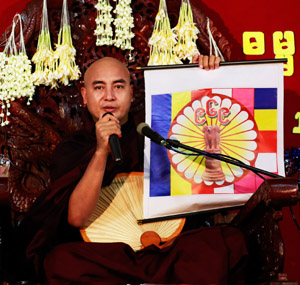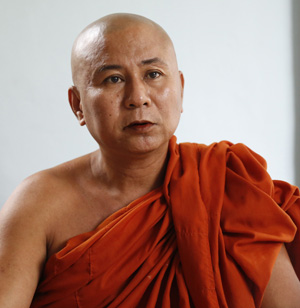The now ubiquitous emblems of the radical anti-Muslim 969 campaign glare at you from Burma’s shop fronts and taxi windscreens. Bootleg DVD sellers hawk discs featuring the sermons of prominent 969 monks alongside the bestselling Korean soap operas. But despite the obvious prominence of the campaign, its radical teachings promoting segregation of Buddhists and Muslims are far from being embraced by everyone.
The Irrawaddy spoke to a 969 leader, MyananSayadaw U Thaddhamma, and an anti-969 monk, U Pantavunsa, to learn more about this controversial movement.
‘It’s Naïve to Say 969 is behind the Unrest’
An interview with MyananSayadaw U Thaddhamma

What is the 969 movement?
The central tenet of Buddhism is the Three Gems—Buddha, Dhamma and Sangha. If they are not in the hearts of Buddhists, the faith will be gone. 969 represents all three. We’ve invented the numerical logo as an emblem of Buddhism, just as a reminder to all Buddhists to contemplate the attributes of the Three Gems, and to promote the religion among those who are not very interested in it.
How long have you been promoting the 989 movement?
I’ve been working on propagating Buddhism for a long time, but just six months on 969. It’s the brainchild of Buddhist scholars who have been studying and teaching the Buddha’s doctrine to hundreds of monks in Mawlamyine. After several meetings and thorough discussions, we launched our mission.
Your ‘mission’ is widely regarded as anti-Muslim. Do you have any comment to make about this?
It’s just speculation. We have nothing to do with saying “no” to other religions. We are just working for Buddhism. People may have different views on what we are doing. We are not trying to defeat other faiths, just strengthen our own.
During recent anti-Muslim riots, 969logos were sprayed on the walls of destroyed buildings. Was 969 behind this?
You should keep in mind that it depends on how people use our emblem. There might be some people who use it as a pretext to promote their cause. But our goal is not like that. Let me remind you that 969 originated in Mawlamyine. If we masterminded all those conflicts, Mawlamyine would have been the flashpoint. No religious conflicts have been reported so far in southern Burma and the Irrawaddy delta, where we gave our talks about 969. Given all these facts, we are guessing that some people misused our logo.
If people are misusing your logo, do you have a message for them?
Three Gems is like water that can bring peace of mind to people. We are like someone delivering that water. But if some people mix it with poison, it has nothing to do with us. I have to say they’ve misused it. We have to blame their stupidity. It’s religiously inaccurate to use our emblem improperly. It’s also naïve to say that 969 is behind the unrest. I want to warn them notto use religion as a pretext for their interests.They will only end up with bad results.
Have you ever thought that your campaign may spark religious conflicts?
Honestly, no. It has never crossed our minds. As I’ve mentioned before, we are like water deliverers. If you impose a ban on the delivery due to its negative consequences, its hows how unwise you are. What happened during the unrest was something that shouldn’t have happened.
During your 969 sermons, you urge Buddhists to shop only at Buddhist-owned businesses. Don’t you think that is an act of discrimination?
I’ve never urged my followers not to trade with people of different religions. I only encourage Buddhists to help and take care of each other. Since members of other religions often only patronize their own businesses,why shouldn’t we support our Buddhist-owned businesses? If they [Muslims] have that kind of discipline, we should have our own discipline for ever-lasting Buddhism.
Is Buddhism under threat?
Burma is the only country in the world where Theravada Buddhism flourishes very well. When our Buddhists are less interested in the faith, our religion will be under threat. Apart from Buddhists, who else will take care of Buddhism? That’s why we are working hard to make people more interested in the religion.
Do you have any response for those who say 969 is religiously narrow-minded?
They are just saying that without studying our mission closely. Since the campaign is led by scholarly monks, you can take for granted that our vision isn’t religiously narrow-minded. It’s not masterminded singlehandedly. What I want to tell the world is that, like the example I gave, we are just delivering water, the water of the Three Gems.We have nothing to do with saying ‘no’ to other religions.We are for Buddhism.
‘Monks are being Used’
An interview with U Pantavunsa

Do you believe in the 969 campaign?
I no longer believe in it. If the campaign is just for meditation or to propagate Buddhism, it’s OK. But what is happening now is some people staged religious attacks using 969 as a pretext, and sparked racial and religious conflicts. This totally deviates from its mission. We still have four major religions all over the world. It’s nonsense in this globalized world to encourage people to discriminate against one religion in favor of another. That idea also diverts from our democratization process. It will prevent us catching up with the rest of the world from a human rights point of view. According to Theravada principles, we just have to follow what the Buddha taught. He never taught anything like what the 969 campaigners are saying now.
Did the Buddha instruct his followers to support Buddhism?
Never. He had some rivals with very different convictions, but he never spoke against them. There is a well-known story of a rich man who previously supported one of the Buddha’s rivals, but who later became a lifelong disciple of the Exalted One after hearing his teachings. But even then, the Buddha told his new follower to continue supporting his old mentors. It shows that he never lectured his disciples to be against others who have different beliefs.
Although the 969 campaign is spearheaded by monks, I’m sure they have no intention to see destructive consequences sparked by their sermons. They are just scapegoats used by some people who want to destabilize the country.
If they are being used, who is using them?
It’s beyond my knowledge, but if you study the patterns of recent riots, you can’t deny the fact that they were well organized and there must have been someone behind them.Thirty-thousand copies of a DVD with 969talks in Mon State have been distributed in Rangoon. So, it’s very evident that they have a sponsor to distribute them on a large scale. There are several possibilities: cronies who would be comfortable doing business with the former military regime or some hardliners reluctant to undergo reform who might secretly finance them. Who knows?
But don’t you think that what themonks are preaching is fueling anti-Muslim sentiment?
Of course, I do. Their actions are against the instructions issued by the Sangha Maha Nayaka, the state-controlled monastic council. What we are not pleased with is that the government used excessive force to crack down on protesters, including monks, of the Chinese-backed Letpadaung copper mine, while they are not bothering to open fire on rioters who were looting, torching and beating Muslims right before their eyes. That makes me feel very uneasy.On the other hand, what those 969 monks preach makes it more difficult for peaceful co-existence between the two communities.In the past, they banned some monks who spoke out about democracy and Aung San Suu Kyi from speaking in public. Why don’t they take action this time, too?
Why has the 969 campaign become so popular?
Because the authorities concerned haven’t taken the necessary action. Plus, even though most of the Burmese are tolerant,there is underlying anti-Muslim sentiment.It’s quite similar to what happened in the past when we heartily supported anyone who said anything bad about the military.
Why has the government failed to stop the spread of the violence?
They might have thought the violence would not have spread that much. Maybe they didn’t take 969 seriously. In spite of the president’s request for all-inclusive approaches to prevent unrest, we have found that, to our dismay, some officials working on the ground are still reluctant to implement them. They keep complaining that they are just waiting for orders. In short, I blame the mismanagement of the government.
This story appeared in the June 2013 print issue of the Irrawaddy magazine.














